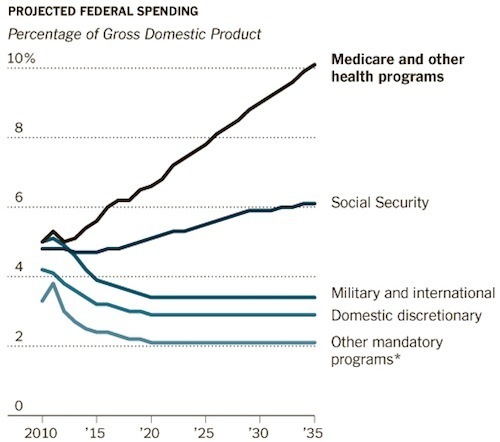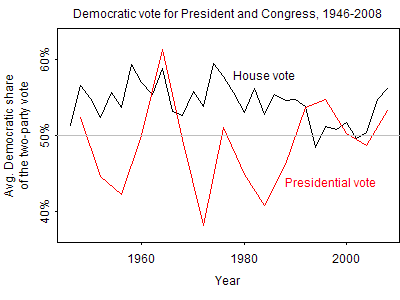Matthew Yglesias's Blog, page 2524
October 20, 2010
Income Effects and Incentives
Michael Kinsley delivered a pretty righteous smackdown of Greg Mankiw on Obama's tax policies that reminded me of a point that I think too often goes missing in these discussions of incentives: income effects.
Specifically, while it's true that if you cut my income tax rates I would have more monetary incentive to pitch new freelance pieces, I would also have more money than I currently have. And if I had more money, I'd feel less incentive to pitch new freelance pieces. Indeed, I might decide that I should take advantage of my higher level of take-home pay by doing less work and enjoying more leisure time.
Now of course if we set a new tax bracket with a cutoff right around my current income point, then fiddling with that rate would purely impact by incentives in a forward looking sense. But that's a pretty special case. For a guy with $500,000 in taxable income, the Bush tax cuts didn't just mean a reduction in his marginal tax rates they meant a giant increase in his post-tax income. I'm trying to picture a guy with that kind of income, someone who presumably already works long hours, coming home one day and saying to his wife "good news, honey, thanks to Bush's tax cuts not only are we more financially secure than ever before but I'm going to respond to that change in our status by working even longer hours and spending less time with you and the kids!" That'd be weird, right?


A Medicare Trial Period
David Leonhardt has an excellent column on how the real problem of the deficit boils down to Medicare and suggests a solution:
In the new issue of the journal Health Affairs, two doctors, both former Medicare officials, have laid out a plan to do so. It would give expensive new treatments three years to prove that they worked better than cheaper treatments, or their reimbursement rates would be cut to that of the cheaper treatments.
I understand that the idea will strike some people as — gasp — rationing. More modest ideas were shouted down during the debate over health reform. But I'd urge anyone who does not like the doctors' plan to think a bit about how Medicare should be changed. The status quo isn't really an option.
The article in question is from Stephen Pearson and Peter Bach and the article is here.
The proposal strikes me as a strong one. Still, to me the really striking thing about the market for health care delivery is the absence of innovations that are aimed primarily at cost-saving. In other sectors of the economy we frequently have firms built around the idea of slightly reduced quality in exchange for dramatically reduced cost. In health care, not so much. That makes it difficult for costs to do anything other than explode.


China-Financed Infrastructure Spending

ARRA Sign, Acadia National Park (my photo, available under cc license)
Reihan Salam writes that "Michael Pettis has a brilliant idea that, alas, will never be put into practice — putting China's surpluses to work in U.S. infrastructure projects."
Based on the one-sentence description, that struck me as a pretty silly idea. The idea, presumably, is that China could do this to keep American consumption high rather than annoying us with their dollar-boosting bond purchases. But dollar-boosting bond purchases finance the US fiscal deficit so we could just accomplish the same thing by engaging in more deficit spending to build more infrastructure. And it turns out that if you click the link this is also what Pettis thinks:
One way for this to happen is for the US government to fund and engineer the infrastructure spending directly. The resulting increase in the US trade deficit would of course be financed by Chinese lending to the US government as it is forced to accumulate USG bonds. But aside from the fact that there is too much pork-barrel politicking involved in US government spending, it will result in a rapid rise in the US fiscal deficit.
Would that matter? No, because this is exactly the kind of fiscal spending that is sustainable. US wealth creation would exceed the rise in debt and so the US is in the aggregate better off. But of course the politics of a rise in the US fiscal deficit are pretty sticky.
And I agree. The politics of additional fiscal expansion are bad. But the politics of direct Chinese for-profit ownership of newly constructed US infrastructure are obviously much worse. So it seems to me to make more sense to just stick to basics and say that the right answer to the "currency manipulation" issue is just for the United States to make policy that's appropriate to our conditions. That means expansionary monetary policy and deficit spending on infrastructure initiatives. China will then need to adapt with some different policies and we in turn will need to adapt to that. Pettis' proposal is useful as a thought-experiment, but it simply goes to illustrate the foolishness of attempting austerity budgeting under present circumstances.


The Kochs' Paranoid Style
I think it's often assumed that a lot of this "OMG socialism Obama is the end of liberty!" stuff is just for yahoos being manipulated by sophisticated moneymen who know better. But one of the more interesting threads to emerge from Kate Zernicke's article about a Koch-convened conclave of rightwing billionaires is that the culture of wildly overstated rhetoric seems to be part and parcel of the internal narrative of the conservative super-elite:
With a personalized letter signed by Charles Koch, the invitation to the four-day Rancho Mirage meeting opens with a grand call to action: "If not us, who? If not now, when?" The Koch network meets twice a year to plan and expand its efforts — as the letter says, "to review strategies for combating the multitude of public policies that threaten to destroy America as we know it." [...]
The participants in Aspen dined under the stars at the top of the gondola run on Aspen Mountain, and listened to Glenn Beck of Fox News in a session titled, "Is America on the Road to Serfdom?" (The title refers to a classic of Austrian economic thought that informs libertarian ideology, popularized by Mr. Beck on his show.)The participants included some of the nation's wealthiest families and biggest names in finance: private equity and hedge fund executives like John Childs, Cliff Asness, Steve Schwarzman and Ken Griffin; Phil Anschutz, the entertainment and media mogul ranked by Forbes as the 34th-richest person in the country; Rich DeVos, the co-founder of Amway; Steve Bechtel of the giant construction firm; and Kenneth Langone of Home Depot.
I suppose I don't begrudge rich businessmen the opportunity to hang out with one another throwing a weird pity party about how overtaxed they are. But it strikes me as almost self-refuting for a bunch of billionaires to be chilling at a lavish resort talking about how Barack Obama has somehow done away with American liberty. At the end of the day the Kochs' biggest policy priority is that they want to continue to get away with profiting from un-taxed air pollution externalities. It's what any rich businessman in a polluting line of work would want, but it's hardly a question that goes to the core of human freedom.


Big Business and Small Government
My colleagues have put together a great feature on a big Koch-organized confab featuring Glenn Beck, the Chamber of Commerce, various billionaires, and rightwing political strategists all getting together to plot for the midterm elections. One particularly interesting name on the list is Tim Carney from the Washington Examiner.
Carney's an interesting case because at a time when most have accused Barack Obama's administration of being full of anti-business leftwing radicals, he's invested his time in making the much more plausible critique that Obama's agenda has been unduly favorable to the interests of big business. It's a plausible critique because I think there's a lot of truth to it. If you look at TARP or the health care bill or the failed cap and trade proposal, all of these were more "pro-business" than I would have deemed ideal. But even while ostensibly covering the intersection of big business and the political system, Carney's done a remarkably good job of ignoring the big picture that America has one political party whose agenda is unduly influenced by big business and another party whose agenda is indistinguishable from big business.
You'd think that's something he might have noticed at the Koch retreat…


Montgomery County Cracking Down on Scourge of Open Windows At Dining Establishments
Elahe Izadi reports that Montgomery County is planning on stepping up enforcement of an ordinance against open windows: "It seems the county's restaurants and officials have only recently become aware of a regulation against open windows in restaurants, one that has long been a part of Maryland law."
Granted that there's something to be said for actually enforcing the laws that are on the books—even the ones people have forgotten about—was there actually some problem here? There's a deli right on my block that just throws the windows open when the weather's nice and I've never in my life heard anyone complain about it, much less suggest it should be illegal.


No More Large-Scale Long-Range Deployment For the New United Kingdom
Richard Norton-Taylor in the Guardian offers an excellent glimpse at the scope of the cuts David Cameron is sketching for the UK military:
Britain's armed forces will no longer be able to mount the kind of operations conducted in Ira qand Afghanistan, the government's strategic defence review made clear today. For at least a decade it will also be impossible to deploy the kind of carrier task force which liberated the Falklands 28 years ago.
Though defence chiefs said today that they will still have significant expeditionary forces, they will not be able to intervene on the scale or tempo of recent years. According to new defence planning assumptions, UK forces will be able to carry out one enduring brigade-level operation with up to 6,500 personnel, compared to the 10,000 now in Afghanistan, plus two smaller interventions, at any one time.
Reduced ability to participate in America's misguided military adventures isn't the worst thing in the world, but this certainly strikes me as an odd priority relative to phasing out second-strike nuclear capabilities. That said, it's nice to see one country at least where politicians seem to grasp that excessive "defense" spending is some of the most wasteful spending you can imagine.


The Importance of Preference Intensity
Dave Roberts' post about how intensity is a bigger problem than ignorance for people hoping to reduce greenhouse gas emissions is excellent.
I would also add that it's pretty general. This is part of the reason 95% of discussion of public opinion about "the issues" is fairly misguided. Voters have a very restricted set of options at the voting booth, so fundamentally what someone thinks about most things is completely irrelevant. How many issues are there out there that could really swing your vote? Consequently, for most causes the most important question isn't how do you persuade the median voter that you're right; it's how many resources can you mobilize (votes, volunteers, dollars, something) to your allies.


October 19, 2010
Endgame
The heat! The slime!
— As people write more and more of these stories about Ordos, China it sounds more like an urban planning failure than a "housing bubble" issue per se.
— Ugandan paper calls for mass hangings of gays.
— Will Palestine be the next Mideast security state?
— in the battle for gay rights.
— Univision backs away from plans to air ad aimed at persuading Latinos not to vote.
For Rabbi Yosef, it's "Born to Do Dishes".


Democrats Are Good At Getting Votes
Ezra Klein mentioned this yesterday and I want to echo his view that the liberal insistence that Republicans are somehow "better at politics" perhaps because of their greater willingness to engage in "hardball" strikes me as pretty dubious. Over the past twenty years, Democrats have won three out of five Presidential elections and carried the popular vote in one of the two elections they lost. Democrats controlled the Senate from 1991-94, from 2001-2002, and from 2007-2010—just about half the time, with the GOP margin coming from the few months before Jim Jeffords switched parties. Democrats have also generally won more votes in the House of Representatives:
So insofar as being "good at politics" means "persuading people to vote for your candidates," the Democratic Party has a pretty impressive record over the past two decades. It's true that a 50-50 split in the House vote leads to a Republican majority, which puts the DCCC at a perennial disadvantage. But that's not a problem of tough campaign ads or aggressive messaging or what have you. Unfortunately, few people understand this quirk of the political system which derives from the fact that the most lopsided congressional districts are full of Democrats.


Matthew Yglesias's Blog
- Matthew Yglesias's profile
- 72 followers








